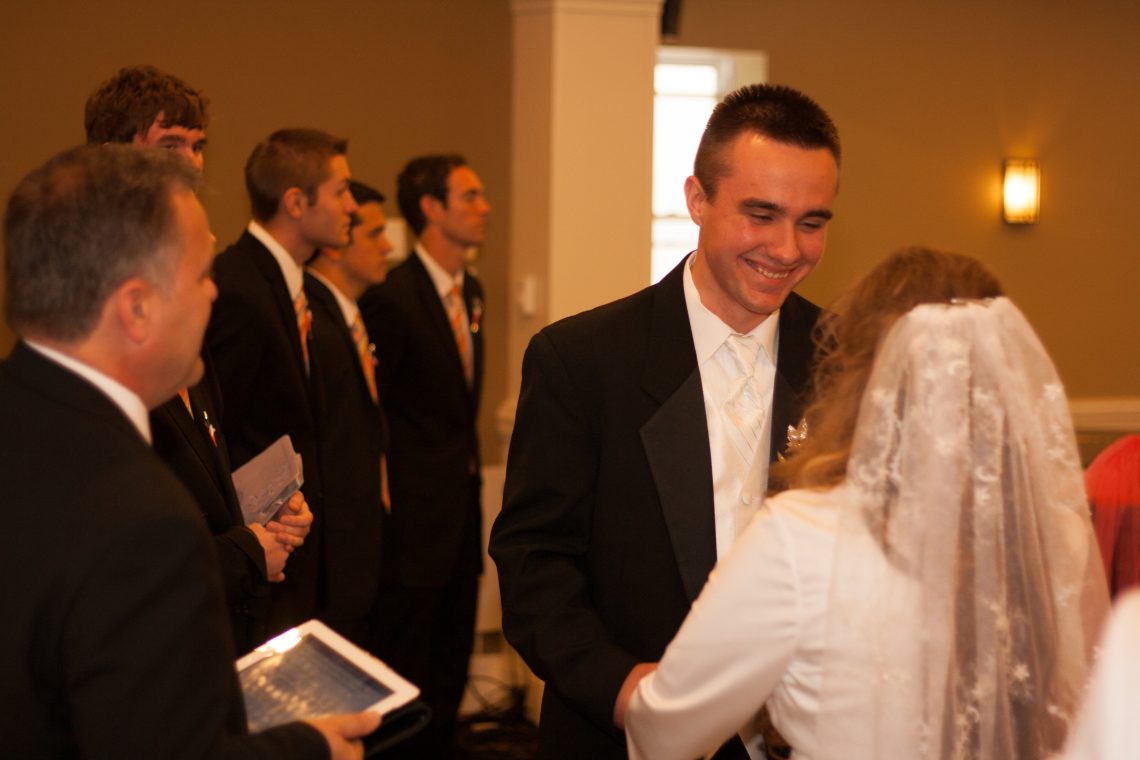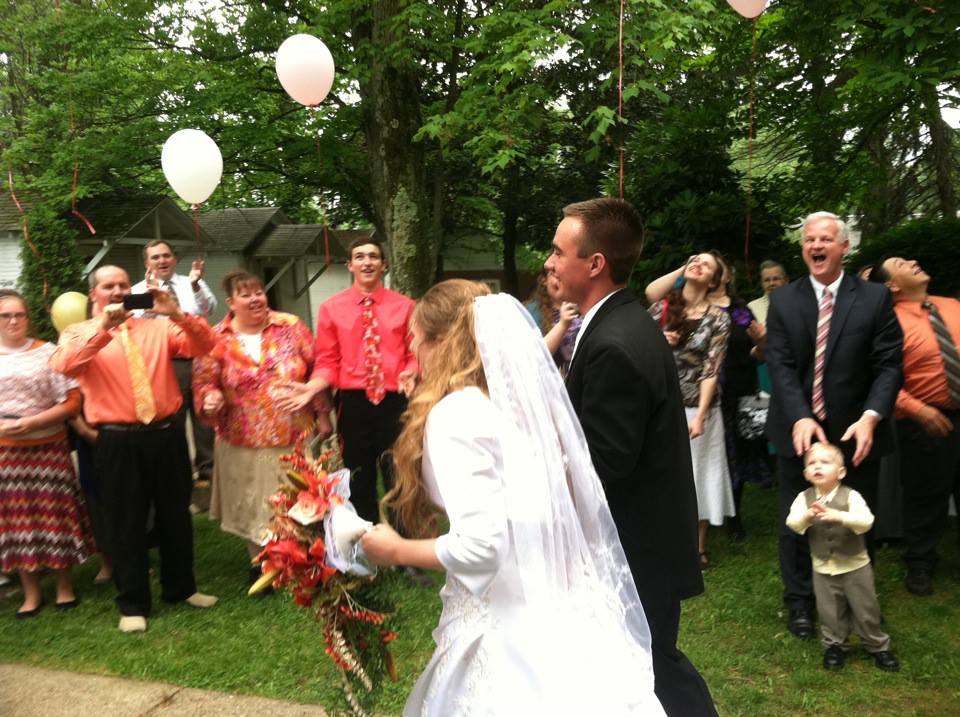
What God Has Joined Together: When Spiritual Control Crossed the Threshold
“What selfish reason made you want to get married?”
That was a question we recently discussed in Sunday School. It came from a book called, “Love Like You Mean It” by Bob Lepine.
I reached back to those days in my mind and recalled, very clearly, the “selfish motive” I had.
I wanted a “buffer.”
It’s hard to explain this to anyone who hasn’t experienced extreme coercive control—but there is a perpetual breaking down of your will and personhood to appease the person in authority, and in the context of Free Gospel Bible Institute, there was no escaping it.
By my mid-20s, I had served the president unreservedly for several years. I was fiercely loyal and I would have gone to the ends of the earth on his behalf. He was my pastor and I saw him like a second father. I can say with confidence, that anyone who knew me in that era knew that I would have taken a bullet for him. But he asked a lot of people.
And when I say ‘a lot’, I’m not simply talking about a heavy workload or a sacrifice here and there. I’m talking about far beyond what was healthy. Thomas Peretic didn’t cross an occasional boundary. He absolutely crushed all boundaries. He was a bully. He demolished people. He had so many unethical, unscriptural, and even abusive demands, that I often felt like it wasn’t possible to live according to the Word of God there, because obeying him would require me to go against Scripture.
Late at night, I’d lie in bed awake and wrestle with the weight of it all.
This isn’t right. It’s too much. I’m collapsing.
In my mind, according to the structure he preached, there really wasn’t a way out for me. Pleasing him was equated with pleasing God. Stepping out from under him was made to feel like stepping out from beneath God. God had been depicted as unhinged and chaotic—an enforcer of obedience to Thomas Peretic. (I encourage you to take a look at his Lessons in Loyalty handouts to see how frequently he invokes spiritualized death threats to enforce loyalty to himself.) This man was my spiritual authority. Because I had no other authority outside of him, if I ever attempted to leave, I would automatically be out of line and “out of God’s will”, which was a terrifying prospect.
It’s not that I was actively trying to leave—I wasn’t. To be honest, while I entertained the idea, I was ultimately too scared to. At the same time, I wanted to be faithful to what I had been convinced to believe was my ‘calling’. I clung hard to the ingrained idea that this was God’s will, but it was exhausting physically, mentally, emotionally, and spiritually. It was unhealthy and questionable in so many ways and it was tearing me apart inside.
I’d sometimes quiet my torments by musing, somewhat despondently, about a day that God might send me a husband. One that would not only stand up for me—but stand up for the Word of God.
I knew that, biblically, a husband would supersede the president’s authority in my life. The authority of a husband would be a sort of “loophole” to the all-encompassing, unquestionable authoritarian pastor structure. As wild as it sounds, back then, marriage was like a “backdoor” if I needed one.
If I married a man with good character, and he lived according to the Word of God, he could provide a buffer between me and the confusing, unethical demands of my current authority.
And that’s just what Mark was. A man who submitted to God’s Word first.
If you’ve read my article about how our time here ended, you already know how that went over.
I never imagined, in a million years, that a pastor would try to undermine or crush that biblical structure—something so sacred that it reflects Christ’s relationship with the Church—but he did.
It’s ironic, because the very man that married us—who stood with us at the altar and said, “what therefore God hath joined together, let not man put asunder,” was the very man who began, systematically attempting to drive a wedge between us.
My head spins when I recall the timeline and how quickly everything spiraled into chaos.
We had our wedding day. We were excited about stepping into a life of full-time ministry as a team. We were content to serve at FGBI, and ready to give it our all.
And then, as if someone flicked a switch, things suddenly got really ugly, really fast.
I’ve tried to trace it back in my mind. Where on earth did it go wrong? What happened?
It started as soon as we returned from our honeymoon.
We had requested two weeks off—one for our honeymoon and one to settle our house.
The time off had been granted.
When we returned—because we still had a week of planned time off—we didn’t show up to work the next morning. But the phone still rang and we were met with a livid rebuke.
We missed the morning meeting so he demanded to see us in his office immediately.
Mark and I were confused, but we assumed it was a misunderstanding and we scrambled to get ready. We were confident that it would all be sorted out when we got there in person. We’d clear the air and go on with our vacation.
There was no sorting it out though.
He saw our absence as an act of defiance.
That was his position and he stuck to it.
We tried, respectfully, to remind him that we were still on a scheduled vacation, but he pushed back.
“That’s not how this works.”
What he meant was that offering an explanation was unacceptable.
The only proper response in this situation was to agree with his assessment and to submit.
The remainder of our scheduled vacation, by default of this conversation, was voided, just like that.
No objections or questions permitted.
Just accept it.
Of course, this felt like a punch in the gut in the moment.
It certainly didn’t make sense to us—but we took it in stride.
We received the rebuke, shook off our confusion, shoved our disappointment aside, rallied ourselves and let it go.
We had no idea that he was only getting started.
The months ahead would hold an endless battering of nonsensical rebuke, public shaming, accusations, suffocating control and intentional interference in our relationship.
On one occasion I was rebuked for submitting to my husband in a matter and when I mentioned Ephesians 5, Thomas Peretic said, “We both know that doesn’t apply here.” I walked away from that meeting so tangled up and confused. It doesn’t? Why doesn’t it? Isn’t Scripture supreme over all of us?
He’d meet with each of us privately in attempts to undermine the other.
On one occasion he stepped into my office and in the course of conversation told me:
“Look, we both know that Mark is not a good leader.”
I was dumbfounded that he would speak poorly of my husband directly to my face and expect me to agree with him.
The same day he met with Mark privately and told him:
“Look, I know your wife a lot better than you do. There are things about her that you don’t know.”
I couldn’t even imagine what he was implying.
There wasn’t a shred of information that I had withheld from my husband.
As the days went on, it would become more and more clear that he was actively attempting to sow seeds of doubt and suspicion between us. Trying to make each of us believe that the other was a problem.
The question was, “Why?!”
What pastor would intentionally attempt to drive a wedge between a married couple?
Newlyweds at that!

In retrospect, it makes perfect sense.
He had been able to control me in every sense for nearly a decade.
Now, I was married.
I knew that my husband was my spiritual head, and that, when it came down to it, he was the one I had the biblical responsibility to submit to.
The president’s control was being threatened.
To re-assert his dominance, he would do everything in his power to sabotage anything that reflected closeness, loyalty, or the prioritizing of one another.
The lengths he went! At the time, it was so confusing. I couldn’t figure out what was going on.
At times he was angelically nice to me, but cruel to my husband out of my sight. I recall sitting on the couch one day, working on yearbook, when my husband came through the door and collapsed into my lap, where I held him as he shook and sobbed uncontrollably. My mind reeled wondering what manner of unnatural treatment could do this to a man.
Other times, he would call me repeatedly, usually right when I was preparing dinner, furious that I hadn’t completed a task I had never been responsible for, and demand that I drop everything to do it immediately. As a result, time and again, I found myself unable fulfill a very basic fundamental of wifely duties—to cook for my husband and share the meal together.
If there was any task that we were knocking out as a team, he divided us immediately. He’d keep each of us so busy, and separate from each other all hours of the day, so that even though we worked and resided on campus, were hardly saw each other.
He would say things that didn’t line up and make accusations that were baseless. We were hit over and over with stipulations that only applied to us and made no sense whatsoever.
You can’t hold hands. It will make the students stumble.
You can’t go to the grocery store together. That’s a waste of time. (Even on our day off!)
Every chance he got he manufactured infractions out of thin air.
His wife flew into a fit of rage and threw a 10×10 wall décor at my head amid a flurry of accusations —but the accusations made no sense.
I had an attitude. Mark was lazy. We weren’t dedicated.
They simply weren’t true.
Every hour we were awake we’d be working. And while they had been consistently treating us with disdain, we were constantly watching our own responses, determined to respond graciously and biblically because we knew anything less was unacceptable.
The secretary at the time informed us in tears that every time we left the office the president’s wife came out and disparaged us—in front of all the faculty and even students who were in there.
Students came to knock on the door of our home tell me, “Sis. Becky—I’m so sorry. We just saw Bro. Peretic treating Bro. Mark horribly in front of a whole group of us and we just wanted to let you guys know that we love and appreciate both of you so much! We do not feel the way he does about you.”
We searched our minds trying to pinpoint where we had gone wrong and what we had done but we couldn’t figure it out.
We were pouring ourselves out for them.
We were bending over backwards to be patient and submissive.
Why were they doing this? What do they want? What could we possibly have done?
That year was so stressful. It was impossible to please him—impossible to measure up. Every morning we woke up with immediate stress over what we’d get wrong that day, what we’d get yelled at for that day. I remember one time, Mark came through the door and he started to convey another expectation or grievance from Thomas Peretic. The second I heard his name—”Brother Peretic…” overwhelming stress hit me like a freight train and I blacked out—fainted and lost consciousness. I remember gradually coming to—caught in a dreamlike state, hearing Mark calling my name—but trapped on a swirling, speeding merry-go-round, with papers and chaos flying all around me. We lost a child to miscarriage later that school year, and while I know that it’s impossible to know the cause, I’ve always believed the unbelievable degree of stress this man created in our lives was a factor.
Looking back I can see that there was no legitimate grievance.
He had to manufacture them, because he had to crush, from the very beginning, every inclination Mark and I had to prioritize one another over him.
He was intentionally creating stressors—painting the picture to each of us that the other was the problem—trying to break us down.
I have since learned that he did this to several faculty couples. Not just us. It was a pattern.
My stomach twists when I think about some of the things that he said and did.
It was only three weeks after our wedding that he called us into his office and rebuked me for my performance as a wife.
I’ll never forget how disorienting that moment was.
He looked across the desk with a clenched jaw and rage in his yellow eyes and said,
“You are destroying your marriage by leaning on your husband emotionally!”
I kid you not.
Leaning…
Emotionally…
Upon my husband.
He was so severe.
It felt like whiplash.
Nothing about that sentence made sense, but I was expected to receive it without question.
In his world, his authority meant you didn’t just submit your actions—you submitted your thoughts. Your instincts. Your conscience. Your relationships.
“I don’t get it. I can’t… I can’t confide in my… my husband?”
He slapped the desk—“WHY CAN’T I CORRECT YOU ANYMORE?”
My mind reeled…
“I don’t know what you mean! I don’t get what you’re saying! How can that…?”
He then told us that he had been calling pastors around the country discussing our ‘behavior’ with him.
I was so confused that I blurted out, somewhat uncharacteristically—“WHAT behavior? We’ve asked and asked what we’ve done and you’ve never told us what we’ve done! Surely if you are talking to pastors around the country about it you can tell US what we’ve done! What have we done?”
He stared hard, clenched his teeth, and pointed his finger at me.
“I’m telling you right now, if you don’t stop leaning on your husband, you will destroy your marriage.”
I was in utter shock. I looked at my husband trying to understand—
Thomas Peretic shouted, “DON’T YOU LOOK AT HIM! YOU LOOK AT ME AND HEAR WHAT I’M SAYING TO YOU!”
My head was absolutely spinning. I was paralyzed.
I had this beautiful, hopeful picture of being in the ministry with my husband, and three weeks in, I was being rebuked for destroying a marriage that I valued more than life itself—and it had hardly even begun!
Nothing made sense.
I knew though, that in that setting, the only acceptable response was to accept his version of what I was and what I had done.
In order to continue existing under him, I had to believe what he said.
I am destroying my marriage.
By confiding in my husband, I’ve committed an unthinkable act.
To me, the severity of the rebuke was what I would expect for infidelity, and I internalized this rebuke on those terms. In order to submit, I had to see my “error” as reprehensible as he saw it.
I can’t express to you the devastation I experienced that day. It was soul-shattering.
I went home and I sobbed for hours, believing I had ruined everything.
I wanted NOTHING MORE in all the world than to be a godly, wife—a blessing to my husband and to the ministry. It was everything I had ever hoped to do and be.
But I had failed.
Not 10 years in. Not 5 years in. Three WEEKS in.
Thomas Peretic painted his version clearly.
I confided in my husband—to correct my failure, I can no longer confide in my husband.
That rebuke lived in my head for years.
It was seared into my mind.
I had to adopt it as part of the re-definition of a “godly wife.”
In many ways, that rebuke shaped the earliest years of our marriage.
It instilled a mortal fear into my heart.
If I confide in my husband, I am influencing him.
If I influence him, even in the slightest manner, I’m the one that’s leading.
When you’ve sat under totalitarian spiritually abusive leadership for a decade, to be the person in a submissive role, accused of leading, feels a lot like being dangled above the Lake of Fire by a fraying thread.
So I submitted.
I stopped confiding in my husband.
To the best of my ability, I didn’t offer my perspective or contribute any input for decisions.
My job was to smile bravely, shut out every concern, and power through.
I surrendered my voice…even in my own home.
It’s hard to quantify and explain the reverberating effects of this. So much unnecessary isolation.
In hindsight, I think about how diabolical his rebuke was.
Cruel beyond words.
Out of all the things we endured by this man’s hands, this is the thing that boggles my mind above all others. This is the thing that hurts the most.
It wasn’t enough to isolate me from mentors, family, and friends. He had done that, systematically, throughout the years. One by one, as voices became a threat, they had to be cut off… until the only feedback I had left was his.
In the end, he attempted to isolate me from my own husband.
I believe he wanted to break down the bond we had with each other—so that neither of us would put the other ahead of him.
He said the words himself—
“What therefore God hath joined together, let not man put asunder.”
And then he tried to tear it apart with his own hands.
As painful as this story is, I am graciously reminded of the kindness of God that transpired in the years ahead. Looking back, it’s very clear that Mark and I weren’t handed a healthy framework for marriage. The picture painted for us, of what our roles were meant to be was one that was warped and convoluted. Our earliest years were challenging as we tried, so desperately, to work within those frameworks and stumble our way through the dysfunction they created.
We knew where to turn though. Over and over, we consistently went back to Scripture and that is where we anchored. The more we turned to Scripture, the more confident we became that this man did not represent Christianity. We were able to set aside his authority—knowing that it was false authority. We did not have to fear him—we only had to submit to God’s Word.
We were married nearly a decade before I realized there was nothing wrong with confiding in my husband, but we were eventually able to recognize and throw off the shackles of old unhealthy frameworks handed to us and enjoy the wholeness of something far superior—of what God intended for us all along: Marriage that mirrors Christ’s relationship with His Church— (Ephesians 5:31-33).
And as we grew in Christ—both as a unit and as individuals, Mark and I experienced the unfolding of a rich, beautiful, healthy relationship with one another. Our marriage today is one of deep friendship, mutual respect, consistent grace, and open communication—where emotional support is freely given and freely received. Mark leads with humility and gentleness, and I am honored to stand beside him, walk with him and support him to the ends of the earth. I marvel at the beauty of God’s grace—that this precious gift has been granted to us. It’s something that I cherish far beyond words can express and I’m grateful that God preserved us when that sacred bond was assaulted by a spiritually abusive leader.
When I think about the beauty of marriage, and what it represents in Scripture, I am dumbfounded that a pastor would treat that relationship with such disregard. Matthew 19:6 isn’t a filagree to decorate a marriage ceremony. It’s a sacred command of Christ. What therefore God has joined together, let no man separate. When anyone seeks to control, manipulate, or divide a marriage, it’s a direct attack on God’s design—and the very idea that a pastor would stoop to this is reprehensible on so many levels.

If you’re a former student or faculty member of Free Gospel Bible Institute and need a safe place to process what you’ve experienced, I’d like to invite you to talk with myself or a trusted team member equipped to walk with you—whether you’re looking for pastoral counsel, help untangling what you experienced, or simply someone who understands, we’re here to help.
You’re not alone.
To share your experience or get connected, visit:
👉 BereanHoliness.com/fgbi
To reach me directly, feel free to use the form below:




